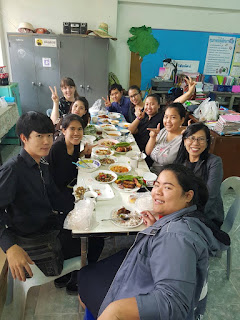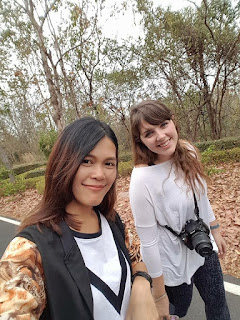Lauren Colby is a 2016-17 Fulbright-AMCHAM English Teaching Assistant (ETA) at Pathumpitthayakhom school in Ubon Ratchathani, Thailand. Originally from Morton, Illinois, Lauren graduated in 2014 from University of Illinois at Urbana-Champaign with a major in Global Studies and minor in Teaching English as a Second Language. Outside of school, she enjoys biking around her neighborhood, going on adventures with her Thai friends, and eating as much Thai food as she can get her hands on. After Fulbright, she hopes to return to the U.S. and complete a master’s degree in Teaching English to Speakers of Other Languages (TESOL).
If you’ve lived abroad before, you know just how many emotions go into every little detail you could possibly think about before leaving. You know the feelings of anxiety for the unknown, the nervousness for things that will be different, and the excitement for new experiences. You ask yourself question after question: what will it be like once I get there? What will I do day-to-day? Will people understand me? Will I make friends? How will I make my life enjoyable and fulfilling while I’m there?
Those last two questions are the ones I found myself coming back to over and over again. Before embarking on my Fulbright Thailand journey, I found myself constantly questioning whether or not I would be able to make friends and become a part of the local community.
Integrating with a new community in any country – at home or abroad – is never easy. I knew this first-hand, as my experience with Thailand actually started long before I became a Fulbright English teacher. After graduating high school, I took a gap year and became a Rotary Youth Exchange student in Udonthani, a province in the Northeast about two hours from the capital of Laos. Between living with Thai host families and attending a vocational college, my experience as an exchange student was incredible, but I always felt a bit disconnected from the community. I spent most of my time with other foreign exchange students and with my host families, and didn’t integrate into my school as well as I would have hoped.
In returning to Thailand as a teacher, I worried about finding ways to become a part of the community. During the one-month orientation provided by Fulbright, those questions echoed in my head over and over again: will I make friends? How will I make my life enjoyable? Nothing during orientation seemed to give me answers I needed.
When I first arrived in Ubon Ratchathani, also in the Northeast of Thailand, I initially enjoyed it much more than life in Bangkok. But when I started thinking about what I would do to fill my time and keep myself entertained, staying in Ubon felt like a daunting task. Getting around was more difficult. Finding things to do was more difficult. Communicating was more difficult. Teaching was more difficult!
Despite those things, the people who began to come into my life made it considerably easier to adjust. Kindness and positive energy flowed like a river from everyone I met. First at my apartment building: my landlords were good friends with my host teacher, and she instructed them to treat me as if I were their daughter. Per their instruction, I call my landlords mae and paw, the Thai words for “mom” and “dad.” In the evenings, we sit outside the convenience store connected to the apartment complex, talking about our day and often eating some of Mom’s delicious cooking. Neighbors who frequent the convenience store have gotten to know my face and name, and one neighbor in particular is an amazingly spry 84-year-old man who loves giving me a strong handshake while practicing his English with me: “How do you do? Good luck to you!”
 |
| Mom and I outside my apartment. |
At my school, I was flooded with acceptance and belonging. On my first day, my host teachers P’Ja and P’Duan introduced me to everyone – the director, the vice director, teachers whose classrooms were near to mine, and of course, the foreign language department. I was by far the youngest of all the English teachers, but the Japanese teacher, P’Fah, was only a few years older than me. P’Fah immediately took me under her wing. Knowing that I would probably be bored if I ate lunch with the English department teachers every day, she brought me to the Thai language arts department, where, little did I know, I would end up spending most of my time hanging out with the seven other teachers that were around my age. Every day before the morning assembly, I drop my bag at the Thai office and go to the assembly with one of my seven friends. Afterwards, we go back to the Thai office and, provided that no one has to teach during period one, we eat breakfast together. At lunchtime, we gather around a long skinny table full of food and often share a giant plate of spicy, tangy som tam (papaya salad). All the while, there’s a constant comical banter as we poke fun at each other, joke around, and laugh a lot. I feel at ease each time I come into the room. It’s such a happy place for me to spend my free time at school.
 |
| Enjoying a big lunch with my favourite group of people. |
In my classes, connecting with students took some time. Because I was the first Fulbright ETA at my school, and my students had never had a foreign teacher before, they were extremely shy. Connecting with them through speaking English was pretty tough. Most of my students assumed that I didn’t speak Thai, and they didn’t feel confident about their English, so conversations didn’t happen much in the beginning. I decided to make it a little easier on them. Outside of classes, I began speaking more Thai. Suddenly, conversations and questions from my students came easily, and they were curious about so many things. “What’s school like in America?” “Do you have to wear uniforms?” “What do your parents do for a living?” “Where do you live in Ubon?” “Are you ever lonely?” I rotated between answering in Thai and English to give them a chance to practice, and eventually, they began asking me questions like, “What’s your favorite Thai food?” and “Can you speak Isaan?” Isaan is the local dialect of the Northeastern part of Thailand and is extremely similar to Lao. After telling them I don’t speak Isaan, my students began to teach me. One of my favorite memories at school involved sitting on the ground during Scout Camp with my M2 students (8th graders) gathered around me, teaching me Isaan words, and hearing them erupt in laughter after each word I said. Another fond memory was surprising my M5 students (11th graders) with sab ee lee ee lo gra do gra deeah – a hilarious Isaan phrase essentially meaning “the most very delicious thing ever.” They were so surprised I knew the whole phrase that the class did not stop laughing for at least five minutes, and each time I saw students from this class in the hallway in the weeks after, they echoed the phrase again and again, chuckling to themselves. Since then, I’ve discovered that I see my students everywhere – at the mall, at the night market, at the park by my house that I love to run and walk at. When I see them outside of school, I can’t help but smile as I feel a sense of community when I look at those familiar faces.
 |
| Last day of class with my M5/2 students. |
Something I didn’t expect was the strength of these relationships that I’ve formed. Without my asking, my community has supported me when I’ve needed it the most. My landlords and neighbors were an absolute Godsend after I had my purse snatched from my bicycle by a stranger on a motorbike, and one of my fellow English teachers immediately came to be with me as a translator while the police were investigating. I simply do not think I would have survived the situation had they not been there for me in a moment’s notice.
A couple months ago, I made friends with Fai and Nune, two Thais who wanted to practice speaking English. We have spent hours together teaching each other bad words in our native languages, giggling the whole time. What I didn’t expect was that on more than one occasion, after telling them I would be having visitors, they kindly, selflessly, and without hesitation took us to see so many beautiful sights in and around Ubon. To have friends like that is a true blessing. Last but not least, after eating lunch with her almost every day, P’Fah has become one of my close friends. Using my stale Thai and P’Fah’s rusty English, we have hilarious conversations – picking on each other constantly and finding ourselves laughing at nothing. Some of my favorite memories involve just going to Tesco (the grocery store) together and being silly, having deep discussions in Thaiglish with the help of Google Translate, and going to another lunch group member’s wedding. When I think of all the people I’m lucky enough to spend my time with, I am so grateful. Why did I ever worry about how I’d manage to make friends in the first place?
 |
| The Lunch Gang at Jum's wedding |
In Thailand, taking care of other people is a huge part of the culture. People often take it upon themselves to take care of you and make sure everything is going well. The most common way that someone shows their care for you is the question gin cow rue yang? Or, “Have you eaten yet?” It’s a simple way for them to check in on you – and if you haven’t eaten, it’s a perfect opportunity for them to make sure you do. As an exchange student, this “take care” culture sometimes frustrated me. I wanted my independence and I wanted to be able to do my own thing without having someone constantly asking me where I was going or offering to feed me when I wasn’t hungry. But after experiencing the “take care” culture for another time, I now understand it in a new light. My relationships have all stemmed from the kindness and unconditional love of “take care” in an effort to make me feel like I belong. It’s taught me to accept kindness and accept love, even when it feels like I haven’t done anything to earn it. Despite not knowing me and despite a language barrier, these people have accepted me as one of their own. Now, my initial fears have finally been put to rest. I’m proud to say that my community in Ubon has helped me feel like Thailand is exactly where I belong.




What a beautiful life you are living, Lauren. Thank you for sharing your happiness and insight!
ReplyDelete